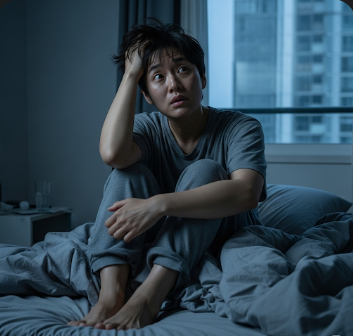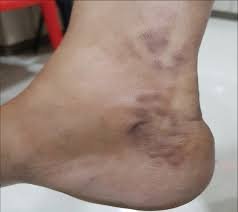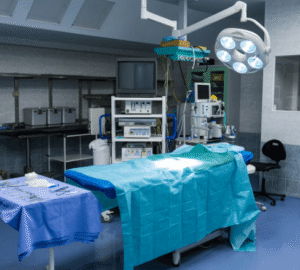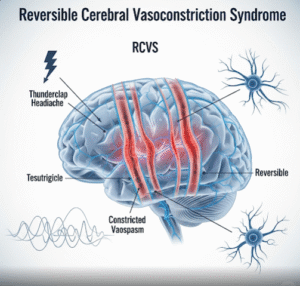Overview
Feeling restless is a common symptom characterized by an inability to relax, constant fidgeting, or a persistent urge to move. It may be temporary due to stress or lack of sleep, or chronic, associated with medical or psychological conditions. In Korea, mental health clinics, neurologists, and general hospitals provide comprehensive evaluation, therapy, and treatment options for individuals experiencing restlessness.
Key Facts
▶ Prevalence: Can affect people of all ages; particularly common in adolescents, adults with anxiety, or individuals with sleep disturbances.
▶ Causes: Stress, anxiety, ADHD, restless legs syndrome (RLS), medications, or medical conditions.
▶ Associated Symptoms: Irritability, difficulty concentrating, muscle tension, insomnia, and pacing.
▶ Treatment Options in Korea: Counseling, cognitive behavioral therapy (CBT), medications, lifestyle changes, and sleep hygiene interventions.
▶ Urgency: Severe or chronic restlessness affecting daily life requires professional evaluation.
What is Feeling Restless?
Feeling restless involves both physical and mental agitation, manifesting as an inability to stay still, persistent fidgeting, or racing thoughts. It is a symptom rather than a standalone disease, often signaling underlying stress, neurological issues, or mental health disorders.
▶ Psychological Restlessness: Linked to anxiety, depression, or overstimulation.
▶ Physical Restlessness: Muscle tension, pacing, or inability to remain seated.
▶ Sleep-Related Restlessness: Difficulty falling asleep, frequent awakenings, or nighttime limb movements.
▶ Medication-Induced Restlessness: Side effects of stimulants, antidepressants, or other medications.
Note: Understanding whether restlessness is temporary or chronic is crucial for proper intervention.
What Symptoms Are Related to Feeling Restless?
▶ Fidgeting or Pacing: Continuous movement or shifting positions.
▶ Irritability: Heightened sensitivity or frustration.
▶ Difficulty Concentrating: Racing thoughts or inability to focus on tasks.
▶ Sleep Disturbances: Trouble falling asleep or maintaining restful sleep.
▶ Muscle Tension: Tightness in shoulders, neck, or limbs.
▶ Racing Thoughts: Mental hyperactivity accompanying physical restlessness.
▶ Impulsivity: Acting without planning due to agitation.
▶ Anxiety or Panic Symptoms: Sweating, rapid heartbeat, or nervous energy.
What Causes / Possible Causes
Feeling restless can result from psychological, neurological, or lifestyle factors:
▶ Stress and Anxiety: Chronic worry, deadlines, or personal conflicts.
▶ ADHD (Attention-Deficit/Hyperactivity Disorder): Hyperactivity and difficulty sitting still.
▶ Restless Legs Syndrome (RLS): Unpleasant sensations in the legs causing urge to move.
▶ Sleep Disorders: Insomnia, sleep apnea, or circadian rhythm disturbances.
▶ Medication Side Effects: Stimulants, antidepressants, corticosteroids, or decongestants.
▶ Medical Conditions: Hyperthyroidism, anemia, or neurological disorders.
▶ Lifestyle Factors: Excess caffeine, nicotine, or prolonged inactivity.
▶ Emotional or Behavioral Factors: Boredom, overstimulation, or chronic frustration.
Note: Identifying the underlying cause is essential to targeted treatment and relief.
When Should I See a Doctor?
▶ Persistent Restlessness: Daily or severe agitation affecting daily functioning.
▶ Sleep Interference: Restlessness causing insomnia or poor sleep quality.
▶ Physical Symptoms: Rapid heartbeat, sweating, tremors, or muscle pain.
▶ Mental Health Concerns: Anxiety, depression, or panic attacks.
▶ Impact on Work or School: Difficulty focusing or completing tasks.
▶ Children or Adolescents: Hyperactivity, irritability, or learning difficulties.
▶ Medication or Substance Concerns: Suspected side effects or withdrawal symptoms.
Tip: Korean clinics provide comprehensive evaluation, including neurological assessment, psychological testing, and lifestyle review to determine the best treatment plan.
Care and Treatment
Management of restlessness involves psychological interventions, medical treatment, and lifestyle adjustments:
▶ Cognitive Behavioral Therapy (CBT): Helps identify triggers and develop coping strategies.
▶ Medications: Sedatives, anxiolytics, or medications for ADHD or RLS, prescribed under supervision.
▶ Relaxation Techniques: Deep breathing, mindfulness meditation, and progressive muscle relaxation.
▶ Exercise: Regular physical activity to release excess energy and improve mood.
▶ Sleep Hygiene: Consistent sleep schedule, avoiding stimulants, and optimizing sleep environment.
▶ Behavioral Strategies: Break tasks into manageable segments, incorporate movement breaks.
▶ Dietary Adjustments: Reduce caffeine, sugar, or other stimulants.
▶ Monitoring: Track patterns, triggers, and response to interventions.
Treatment Options in Korea
Medical Evaluation:
▶ Psychological Assessment: Screening for anxiety, depression, ADHD, or stress-related disorders.
▶ Neurological Examination: Evaluate for RLS, hyperthyroidism, or other nervous system issues.
▶ Laboratory Tests: Blood tests for anemia, thyroid function, or nutrient deficiencies.
▶ Specialist Consultation: Psychiatrists, neurologists, or sleep medicine specialists for targeted care.
Advanced Therapies:
▶ CBT Programs: Structured therapy for chronic anxiety or restlessness.
▶ Medication Management: Optimized pharmacotherapy for ADHD, anxiety, or RLS.
▶ Sleep Therapy: Cognitive behavioral therapy for insomnia (CBT-I) or other sleep-focused interventions.
▶ Multidisciplinary Care: Coordination among mental health, neurology, and occupational therapy professionals for holistic treatment.
Rehabilitation & Support:
▶ Patient Education: Techniques to manage restlessness, recognize triggers, and adopt healthy routines.
▶ Follow-Up Care: Regular check-ins to assess treatment efficacy and adjust plans.
▶ Specialist Clinics: Korean hospitals provide integrated care combining therapy, medical management, and lifestyle coaching.
Outcome: With early recognition and comprehensive treatment in Korea, feeling restless can be effectively managed, improving concentration, sleep, emotional stability, and overall quality of life.













